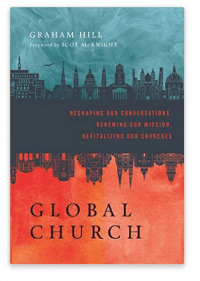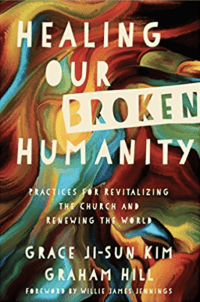7 Inspiring Women: Catherine Mowry LaCugna

In this entry, we’re looking at the work of Catherine Mowry LaCugna.
LaCugna was a brilliant young theologian with a passionate interest in three interrelated themes: exploring the radical consequences of trinitarian theology; elevating the role of women in church and society; and inspiring the church to serve the marginalized, wounded, and broken.
She taught systematic theology at the University of Notre Dame, until she died at the age of 44 from cancer. Even though she was only young when she passed away, she left a remarkable theological legacy. Her vision of the church and its mission in the world was shaped around a life dedicated to loving service, often among forgotten and ignored people.
LaCugna felt concerned that the doctrine of the Trinity had become a cold, rigid, abstract idea—a doctrine that seemed to have little relevance to the life and work of people on the front lines of ministry and service. But, for LaCugna, a vision of the dynamic, life-giving Trinity needs to be reclaimed in a way that inspires mission, revitalizes churches, and expresses how people encounter their inner experience of God. LaCugna believed that the doctrine of the Trinity is a “practical doctrine with radical consequences for the Christian life.”
The doctrine of the Trinity is ultimately a practical doctrine with radical consequences for Christian life . . .
Because of God’s outreach to the creature, God is said to be essentially relational, ecstatic, fecund, alive as passionate love. Divine life is therefore also our life. The heart of the Christian life is to be united with the God of Jesus Christ by means of communion with one another.[1]
LaCugna considered the doctrine of the Trinity to be the foundation of Christian theology. She saw it as a neglected doctrine. She unpacked its radical implications for faith, life, relationships, church, ministry, salvation, and mission.
An enthusiastic advocate for women, LaCugna believed that a doctrine of the Trinity that supports the subordination of women to men is unnatural. For LaCugna, a doctrine of the Trinity that leads to patriarchal and hierarchical structures, and to the obedience and submission of women to men, is defective. A theology of subordination and so-called complementarity leads to inequality. And it results in division and exploitation and alienation. This theology of the Trinity is widespread in western circles. But, for LaCugna, it is a diseased, defective, and deformed theology of the Trinity.[2]
LaCugna’s doctrine of the Trinity has no room for such notions. First, she believes that the Fall is the source of the subordination of women to men. God’s divine plan is for mutuality, communion, freedom, equality, and mutual submission. Redemption ushers in God’s original plan for creation. Second, Jesus Christ does away with hierarchy, patriarchy, and subordination. he replaces these with deep communion, full equality, freedom from rule, and revitalized mutuality.
Christian feminism expresses an eschatological hope for the true communion among men and women. In the reign of God, when all tears have been wiped away, women and men will no longer find themselves in the estrangement of “otherness” but will be one in Jesus Christ, living together harmoniously in the household of God . . .
The life of Jesus Christ is at odds with the sexist theology of complementarity, the racist theology of white supremacy, the clerical theology of cultic privilege, the political theology of exploitation and economic injustice, and the patriarchal theology of male dominance and control.[3]
LaCugna called for an integration of theology, soteriology, doxology, and ecclesiology. We must integrate our reflection on the mystery and being of God (theologia) with our reflection on and participation in the mystery of salvation (oikonomia). And we must do this is a spirit of worship.
The following quote sums up LaCugna’s vision. She shows how the church expresses this theological integration, trinitarian faith, worshipful and praising posture, life together, and missional existence.
Living trinitarian faith means living God’s life: living from and for God, from and for others.
Living trinitarian faith means living as Jesus Christ lived, in persona Christi: preaching the gospel; relying totally on God; offering healing and reconciliation; rejecting laws, customs, conventions that place persons beneath rules; resisting temptation; praying constantly; eating with modern-day lepers and other outcasts; embracing the enemy and the sinner; dying for the sake of the gospel if it is God’s will . . .
Ecclesial life is a way of living in anticipation of the coming reign of God. The church makes a claim that civil governments do not: that it is the People of God, Body of Christ, and Temple of the Holy Spirit. The life of the church is to be animated by the life of God; the church is to embody in the world the presence of the risen Christ, showing by its preaching and by its own form of life that sin and death have been overcome by Jesus Christ. The church also claims to embody in its corporate life the presence, fruits, and work of the Holy Spirit, to be the visible sign of God’s reign, of the divine-human communion, and the communion of all creatures with one another.
In sum, the church claims to live the form of life appropriate to God’s economy, to point to the reign of God within the oikumene, the whole inhabited earth.[4]
In this way, the church joins with God in his mission in the world.
LaCugna’s genius is in her ability to engage historical and contemporary eastern and western theological sources as she constructs a vision of the church that is both trinitarian and missional.
LaCugna is convinced that a theology of God and a theology of mission are inseparable. It’s impossible to conceive of the Trinity without God’s redemptive self-giving and self-communication, as God reaches out to all creatures from the creation to the eschaton—especially through Jesus Christ in the power and presence of the Holy Spirit—seeking to lead us into communion with God and each other.
What LaCugna does well (as a systematic theologian, steeped in western and eastern systematic theologies) is show how the mystery of salvation and the mystery of God were decoupled (historically) in western trinitarian theology. She then constructs a fresh trinitarian and missional vision of the church, bringing these things together, and exploring the radical implications for church, theology, society, and mission.
LaCugna discusses the ways the church can express this trinitarian life in its ecclesial life, sacramental life, sexual life, ethical life, and spiritual life.[5]
The doctrine of the Trinity provides the basis and criteria for constructing and measuring our theology, fellowship, ethics, sexuality, worship, spirituality, and mission.[6]
Joining with the Son in his Spirit-empowered mission (to the glory of the Father), the church seeks the salvation and restoration of all things. This is a trinitarian vision, and one committed to radical discipleship, service and mission. We are called to live as Jesus Christ lived, to love those he loved, to join him in honoring those despised by the world, and to serve the very same people he served.
Other posts in this series
Want more on Catherine Mowry LaCugna? This blog post is an excerpt from Chapter 1 of my book “Salt, Light, and a City, Second Edition: Ecclesiology for the Global Missional Community: Volume 1, Western Voices.” You can get the book here.
Graham Hill
Graham Hill (PhD) teaches at Morling College in Sydney, Australia, and is the Founding Director of The GlobalChurch Project – www.theglobalchurchproject.com. He’s the author of “GlobalChurch: Reshaping Our Conversations, Renewing Our Mission, Revitalizing Our Churches” (IVP, 2016), and “Salt, Light, and a City, Second Edition: Ecclesiology for the Global Missional Community: Volume 1, Western Voices (Cascade, 2017).”
© 2017 All rights reserved.
Copying and republishing this article on other Web sites, or in any other place, without written permission is prohibited.
Want to get your hands on more, see our subscriptions
Books
Don’t forget to buy Graham Hill’s books:
- Global Church
- Salt, Light, and a City (second edition)
- Healing Our Broken Humanity



Comments: We’d love to hear your comments and reflections on this blog post!





